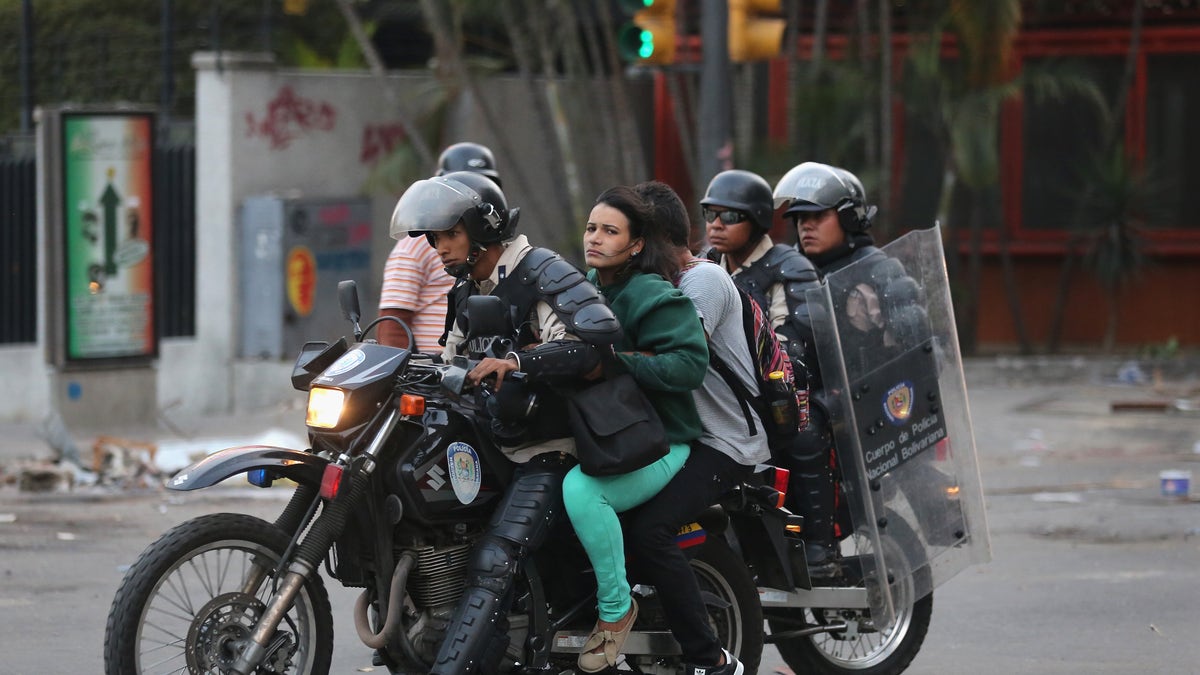
CARACAS, VENEZUELA - MARCH 06: Venezuelan national policemen detain anti-government demonstrators on March 6, 2014 in Caracas, Venezuela. Protesters continued to stage demonstrations nationwide against high inflation and crime. (Photo by John Moore/Getty Images) (2014 Getty Images)
CARACAS – In the last 10 days, criminal gangs in Venezuela have carried out six separate attacks against police forces using hand grenades.
Police say that in four of the incidents – in the states of Carabobo, Miranda and Guarico – a total of eight officers and four civilians were wounded. In all cases, the M.O. was hand bombs thrown from moving motorcycles.
The last attack, early Tuesday morning, caused damage to a police precinct in Miranda’s city of Higuerote, approximately a two-hour drive from Caracas.
While the explicit motive behind the attacks remains unclear, authorities and experts believe they are part of an ongoing terrorist plot that may continue over the next weeks and even months. The cases have been assigned to the antiterrorist division of the Scientific, Penal and Criminal Investigations Police, and the two suspects captured so far have been charged for terrorism.
“Four of the attacks were against police precincts that seem to have been carefully picked. That’s not a coincidence. Over the last five years we have seen a fast growth of criminal gangs, which now have more than 100 members,” Luis Izquiel, a local criminologist and lawyer in Caracas, told Fox News Latino.
- Venezuelans protest crime and hunger as scarcity continues
- Colombians take all they can as Venezuela deports them
- Venezuelan human rights official says he was held at Mexican airport on U.S. request
- Venezuela navigating steadily toward hyperinflation
- After years-long manhunt, Colombian military kills notorious cocaine warlord
- Pablo Escobar’s other legacy in Colombia: ‘Hacienda Napoles’
- Best Pix of the Week
- Oregon community tries to heal after college shooting: ‘Violence will not have last word’
Government officials and opposition leaders suggested that the attacks could have come as a reprisal for the death of Jhonny Aponte, or “Mini Joe,” a 49-year-old boss of a criminal gang that operates in central Venezuela and Caracas.
Aponte’s death came at the hands of the newly created Operation Liberation and Protection of the People (OLP in Spanish), which has been credited with the killing of more than 80 gang members since late July.
But not everyone thinks the grenade attacks are acts of revenge.
“The police forces of Baruta and Miranda, two of the [targets] attacked, haven’t participated in the OLP, so there wasn’t a reason for them to be punished. Maybe there are some groups interested in creating shock around the country, but we don’t know yet who they are”, said Javier Mayorca, member of the Venezuelan Observatory of Organized Crime, a local NGO.
Coincidentally, last week President Nicolas Maduro announced that men in motorcycles had attacked an electric plant using grenades. He didn’t specify which plant it was, but said it was clearly part of a plan to “sabotage” the country’s public services.
According to a report published Sunday by El Nacional, a leading newspaper, the number of criminal cases involving grenades increased 155 percent in 2015. During the first 9 months of the year, 33 hand bomb attacks have been reported, 11 of them in Caracas.
“The government declared state of emergency over the border with Colombia for less than this. If the attacks continue, we don’t know what kind of actions they might take,” Mayorca said.
While Venezuela has the second highest rate of murders in the world, this kind of attacks are highly unusual in the country’s recent history.
“In other parts of Latin America, like Mexico, Central America or Colombia in the 90s, these things happened. But is something completely new here,” Izquiel told FNL.
“It could be caused by the power criminal gangs have been gaining over the last few years. The government needs to stop this before it gets worst and harder to control,” he added.
The Venezuelan Observatory of Organized Crime said that as of July 12 significantly large criminal gangs were operating in Caracas and five other states spread across the country.
Another sign of the rise of organized violence in the country is the presence of not only grenades but other war weapons, like high-caliber rifles, that are only allowed in the National Army ranks.
“Right now grenades are quite easy to find and can be bought for 120,000 bolivars ($150 at the black market exchange rate),” Mayorca said.
“In Venezuela this situation will not improve until we fix our judicial and prison systems. Plans like the OLP’s are not going to be successful because they don’t address that, which is the heart of the problem,” Izquiel told FNL.







































